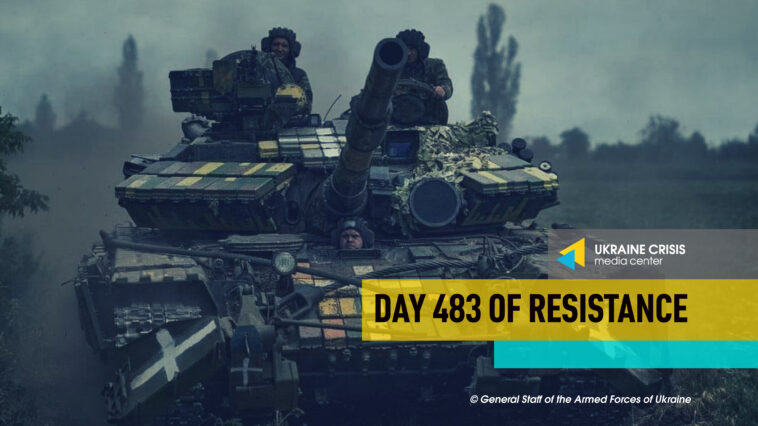Zelenskyi says Ukraine’s counteroffensive is “not a Hollywood movie”. In Kherson region, Russian forces collect the bodies of flood victims, and send them to an undisclosed location, Ukraine government spokesperson says. The share of Ukrainians satisfied with their freedom triples, a survey finds.
Ukraine’s counteroffensive not going easily because 200,000 sq km of land were mined, Zelenskyi says
In an interview with the BBC President Zelenskyi said one of the reasons battlefield progress in Ukraine’s counteroffensive had been “slower than desired” is because large swaths of territory had been mined by the Russians.
“Some people believe this is a Hollywood movie and expect results now. It’s not,” he told the BBC.
Zelenskyi said the military push was not going easily because 200,000 square km of Ukrainian territory had been mined by Russian forces.
“Whatever some might want, including attempts to pressure us, with all due respect, we will advance on the battlefield the way we deem best,” Zelenskyi added.
In Kherson region, Russian forces collect bodies of flood victims, send them to undisclosed location, Ukraine government spokesperson says
Russian-installed officials in left-bank Kherson region collect the bodies of flood victims and send them to an unknown location about two weeks after flooding that inundated the area following Russia’s blowing up of the Kakhovka hydroelectric power plant, head of the press office of the Kherson regional military administration Oleksandr Tolokonnikov told Radio Free Europe/Radio Liberty.
“They put all bodies they find into black bags and take them away in an undisclosed direction. They say they take them to Kalanchak,” he said.
He said it is not possible to count the bodies of the dead that families bring to hospitals. “They write down any other cause of death but drowning, so that there is no record of victims of their terrorist act and they can hide their crimes, as always,” Tolokonnikov said.
He said Russian occupying forces ignore the calls by local residents to clear the rubble of the collapsed houses, as there could be bodies in the rubble of homes.
The number of victims, particularly the number of those killed, could be very high, he said, adding that Ukrainian authorities cannot record the number of victims as they cannot access the area under Russian occupation.
“All we can get is the number of the dead provided by the hospital. For now, it’s 11 in Oleshky, and about the same number in Hola Prystan,” Tolokonnikov said.
Share of Ukrainians satisfied with their freedom triples, reaches 84 per cent, survey finds
The share of Ukrainians who say they are satisfied with their freedom grew from 62 per cent in 2021 to 84 per cent in 2023, a survey conducted by the Razumkov Center finds.
When asked what was more important: freedom or equality, 75 per cent chose freedom, up from 71 per cent in 2022, and 64 per cent in 2020.
When asked to choose between freedom and security, a majority of Ukrainians (54.5 per cent) chose security over freedom (44 per cent). But overall the choice of security declined considerably compared with 66 per cent in 2020. All of this is happening against a backdrop of a full-scale war and a growing demand for feeling safe.
When asked to choose between freedom and prosperity, Ukrainians fall firmly on the side of freedom. In 2010, roughly equal shares of Ukrainians chose freedom (32 per cent) and prosperity (30 per cent). In May 2023, 51 per cent of Ukrainians chose freedom (51 per cent) over prosperity (23 per cent).
The survey was held by the Razumkov Center between May 23 and 31, 2023, through MATRA program financed by the government of the Netherlands. The pollster surveyed a sample of 2,020 adults over the age of 18.
The margin of error does not exceed 2.3 per cent. Additional sampling errors may result from forced migration of millions of Ukrainians following the Russian aggression.
International experience in helping sexual violence survivors. Ukraine in Flames #468
Gender-based violence is amplified in conflict-affected regions due to various factors. These factors include inadequate security measures, the absence of a functioning legal system, prevalent impunity for offenders, a lack of trust in occupying forces, and the societal stigma surrounding the disclosure of incidents involving sexual and gender-based violence. In times of war, it is crucial to prioritize the safety and well-being of women, particularly those in conflict zones. Watch Ukraine in flames #468 to find out about protecting women’s rights during the war and how international experience can help Ukraine in this matter.
Guests:
- Khrystyna Kit, Head of NGO Ukrainian Women Lawyers Association “JurFem”
- Albina Basysta, Legal Consultant of the People’s Deputy
- Kateryna Cherepaha, President of the Public Organization “La Strada-Ukraine”
- Andriy Gerasymenko, Deputy Director of the Department of Social Statistics of the State Statistics Service of Ukraine

